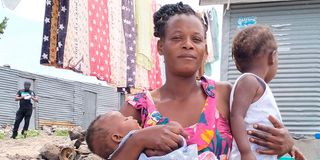Agony of expectant women on island with no hospital

Belinda Anyango with her two children, who have an age gap of eight months, in this photo taken on November 18, at Aluru Island in Migori County. She is one of the women who have to struggle to get access to family planning methods.
What you need to know:
- 1,000 - Estimated population of Aluru Island on Lake Victoria in Migori County
- 59 - Percentage of women who access family planning services in the county as of 2021
- 8 - Percentage of women who still give birth at home in the county
When Benta Atieno went into labour last year, the only available midwifery resource person was her husband.
But he lacked skills in birthing. In the middle of Lake Victoria, in the dead of the night, with no boat to cross to the mainland, Benta became scared and bewildered. She didn’t know what to do.
She is a resident of Aluru Island, where it takes an hour for a boat to cross to Sori Karungu, the closest town in the mainland, Migori County. Public boats charge Sh500, but hiring a boat at a time of emergency costs between Sh6,000 and Sh7,000.
Such a cost is too high for residents who depend on fish as the primary source of their livelihood. Patients or expectant mothers are, therefore, left at the mercy of natural selection – survival of the fittest.
Crammed into a hodge-podge of corrugated-iron houses, bars and lodges, the residents have to put up with the constant urge to answer the call of nature as there are no toilets on the island.
Those in Benta’s situation have to endure labour pains for hours, oftentimes days, because there’s neither a hospital nor trained health care providers to serve the population of about 1,000 people.
For the past nine months, Benta only went for her antenatal clinic check-up once and only because she was spotting blood. She did not get the necessary vaccination when she was pregnant.
“It is very costly to go to the clinic, the public boat docks at 11am and waits for people until it is packed and by the time I get to Sori, the clinic hours are done. I have to pay for accommodation and wait for the next day’s clinic. The minimum one spends is about Sh3,000,” she told Healthy Nation.
At the time of her labour, the fishermen had gone back to the lake for a fishing spree. The last public boat leaves at 3pm to the mainland and only comes back the following day.
“It was the worst time,” says Tobias Okello, Benta’s husband and the chairperson of the island’s community.
He made several calls to the mainland to get a boat when his wife went into labour to no avail. All the engines, he says, were switched off and no one was around to drive the boat.
“The ones that were available were not fueled. There wasn’t any open fuel station at that time. It was me and my problems,” he narrates.
As he was struggling to get a boat, his wife’s birth water broke. The baby was coming amid excruciating pain. Sent into a tailspin of anxiety, he made several calls to his neighbours, but neither was able to help without clinical gloves.
She laboured for several hours. At exactly 3am in the morning, the baby was finally coming out. All Tobias was praying for was a safe delivery. He washed his hands and carefully pulled the baby out. He cut the umbilical cord and wrapped the baby in a shawl.
“When I heard the voice of my child, I was very happy and thanked God,” he says.
Another hiccup, the placenta did not come out. Now Tobias recalled the traditional way he saw his mother, who was a birth attendant, perform and suffocated his wife with his right hand and, while she struggled for breath, pressed her lower abdomen, and luckily enough, it came out.
“It was by the grace of God. Imagine going into labour and you are very sure that there is no trained person to help you. This is what happens to many women in Aluru Island who weather a storm to give birth to their bundles of joy on a boat or a rock,” Benta says.

Ms Benta Atieno Tobias, 34, gave birth with the help of her husband after waiting for hours for a boat to take her to the hospital on the mainland.
She was lucky to have survived. For some with complicated labour, haemorrhages or those who experience sudden, dangerous increases in blood pressure and have to wait hours before being taken to the hospital, maternal death is inevitable.
But she is just a representation of hundreds of women on islands around Lake Victoria, including Remba and Migingo, who have to go through near-death experiences to give birth and even have their babies vaccinated.
For many women on the island, it all stops with giving birth. Many of the children born on the island have not been to the hospital and that means they have not received the required vaccination.
This is the same case with Benta’s son, who six months after birth, has not been immunised. She has not had the chance of going out of the island for the last year.
Missing vaccination exposes children to debilitating diseases such as polio, pneumonia, meningitis, measles, influenza and hepatitis.
These diseases, long identified as among the most significant health threats in the region, could ravage the nation in coming years if these children are exposed to their vectors.
Health experts say it is not easy to measure the gravity of the situation.
“Vaccination is the safest way to protect children and pregnant women from a long list of serious and potentially life-threatening illnesses,” Dr Walter Otieno, a Western Kenya-based paediatrician, tells Healthy Nation.
“Vaccines protect children by preparing their immune system to recognise and fight deadly infections. When a child misses a vaccine and there is an attack, for instance, the likelihood of that child going down with the virus is high.”
Even if they cannot do it every month, the county government of Migori is expected to organise outreach and take the vaccines to the children. “Better late than never,” Dr Otieno says.
Tobias, who has lived on the island for the last 20 years, says despite continuous calls for the government to make the island accessible, that has always fallen on deaf ears.
“What really surprises me is that we have made several visits to the government to even put a structure and one nurse to take care of our people but all we get are just promises,” he says.
He says they have requested for a boat ambulance to take care of the expectant women and the sick, but nothing has been forthcoming over the last 10 years.
“The last time we saw a community worker was last year and he only supplied us with condoms and water guard for treating water because we drink water direct from the lake,” he says.
Health care has been out of reach for years, and the community feels it is not considered part of Migori County.
However, despite facing problems and having to go through nightmares giving birth, women are still having unplanned pregnancies because they cannot access contraceptives.
They either have to travel to the mainland or wait forever for the county’s outreaches.
Belinda Anyango, aged 31 and a mother of three, had her last two babies at an interval of eight months only.
When she gave birth to her second born she also had difficulties. She knew she would take time before having another baby, unfortunately, another baby came.
“I have always known that when a mother is breastfeeding, it is another family planning method, I was wrong, I got pregnant while breastfeeding,” she says.

Mary Atieno, 27, a mother of four who has not used any family planning method on November 18 at Aluru Island in Migori County.
For two years now, she has not been to the mainland. All her children have not been vaccinated and even during her pregnancy, she was never vaccinated.
“I really want a family planning method but I do not have the money even for my transport. While going to the mainland, I have to carry the two babies with me. If the county brings the healthworkers here, then I will get help,” she says.
The biggest problem Aluru Island is facing is the abandonment of responsibility by the government. The right to access health care is recognised as a human right, but the local community has been denied this right.
“It becomes more urgent to address this when it involves people travelling through the lake and in the middle of the night to access health care,” says Ms Evelyne Opondo, Africa Director at the International Center for Research on Women (ICRW).
She says: “Everyone deserves the right to determine, as best they can, the course of their own lives. Whether and when to have children, how many, and with whom and where to have them.”
Too often, family planning programmes across many counties serve the biggest populations and not necessarily the populations that have the highest need like the women of the Lake Victoria islands.
Looking at the barriers that prevent some particular populations from accessing sexual reproductive health services, including the distance from the island to the mainland and the lack of facilities that offer the services within the vicinity, Ms Opondo asked some of the conservative county governments to drop the retrogressive laws that prevent women from accessing the services.
She also emphasised the urgency by governments to address the growing number of populations who need the services but have a harder time accessing them because of policy, stigma or affordability.
Dr Joseph Okidi, Migori County Director of Health, said they are doing all they can to ensure that services are improved in islands in the county.
According to Dr Okidi, the county had conducted about 40 outreaches to support maternal and family planning services, which has since increased the uptake of family planning from 41 per cent in 2020 to 59 per cent in 2021. However, no outreach had been carried out at the island for the last two years.
The county’s skilled delivery stands at 92 per cent, with the remaining eight per cent of women giving birth at home, including those in Aluru who have no access to health facilities.
He acknowledged that maternal deaths are still a problem in Migori County where two mothers die every month of preventable pregnancy causes, with the county government attempting to address the situation.
“We have done a lot in equipping our health care workers with the necessary skills and also working with a traditional birth attendant to refer expectant women to the facility to give birth. This has since improved the numbers and more women are now giving birth in hospital,” he said.
But these efforts appear to be doing little to avert the situation. In the past one month, he disclosed, they recorded three maternal deaths caused by post-partum haemorrhage and hypertensive disorder in pregnancy.




